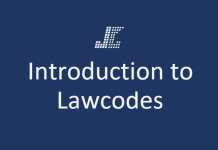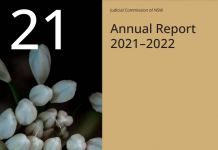Introduction
The Judicial Commission of NSW (“the Commission”) introduced a Code of Conduct for members of its staff in August 1992 and the Code has since been amended and revised. The Code is modelled on the Code of ethics and conduct for NSW government sector employees and sets forth those principles which officers of the Commission are expected to uphold. It establishes standards of behaviour and levels of accountability for all staff members and aims to assist in the resolution of ethical issues in the workplace.
The Code of Conduct is based upon the premise that staff members will act with:
- integrity
- honesty
- fairness
- conscientiousness
- compassion
- loyalty to the public interest
and that they will, in carrying out their duties, adhere to the spirit and intention of the Judicial Officers Act 1986.
Application of the Code
The Code applies to every individual employed, appointed or otherwise attached to the Commission and includes all persons engaged to provide the Commission with services, information or advice.
Principles of the Code
The Code is not intended to be read as an exhaustive statement nor should each word be scrutinised for its legal meaning. The Code is designed to convey, in plain language, the obligations placed on, and the behaviour expected of, all staff of the Commission.
1. Public confidence
The public are entitled to expect that officers of the Commission, in carrying out their duties, act honestly and with integrity and always act in the public interest and not in their private interest.
2. Rights of staff members
The rights and entitlements of staff members of the Commission are similar to the rights and entitlements of other employees in the public sector as set out under statute and at common law.
3. Conflicts of interest
Staff members should avoid any financial or other interest or undertaking that may directly or indirectly compromise the performance of their duties. A conflict of interest should be assessed in terms of the likelihood that an officer possessing a particular interest might be influenced, or might appear to be influenced, in the performance of his or her duties in relation to a particular matter. In these situations, the onus is on the staff member to notify his or her senior officer(s) if a potential or actual conflict of interest arises or may arise. In most cases, the early and open disclosure of such an interest will allow management to prevent a conflict of interest occurring.
4. Corrupt conduct
Section 11 of the Independent Commission Against Corruption Act 1988 requires that the Chief Executive report to the Independent Commission Against Corruption any matter that is suspected, on reasonable grounds, to concern corrupt conduct that has occurred or may occur. This implies a duty on all officers to report suspected corrupt conduct through the internal reporting mechanism listed hereunder:
- Where an officer suspects corrupt conduct to be occurring, the officer must discuss the allegation with the Divisional Head who will pass on all allegations of corrupt conduct to the Chief Executive.
- If an officer does not consider it appropriate to disclose an allegation of suspected corrupt conduct to the Divisional Head, it should be made to the Chief Executive or directly to the Independent Commission Against Corruption.
5. Acceptance of gifts or benefits
A staff member should not accept a gift or benefit that is intended to, or is likely to, cause them to act in a partial manner in the course of their duties.
Token gifts or benefits may be accepted where refusal to accept may offend provided, however, that the Chief Executive or other member of senior management is satisfied that there is no possibility that the recipient might be, or might appear to be, compromised in the process.
Staff should advise an appropriate senior member of staff if they believe that they have been offered a bribe or if they have been offered or received a favour or benefit.
Employees dealing with, or having access to, sensitive investigations or commercially sensitive information should be particularly alert to inappropriate attempts to influence them.
6. Personal and professional behaviour
All staff members shall perform their professional duties diligently, impartially and to the best of their ability.
In the performance of their duties officers shall:
- keep up to date with changes and developments in their area of expertise;
- comply with any legislative, administrative or procedural requirements;
- maintain proper and adequate documentation to support decisions made;
- treat other staff members and members of the public in a respectful and courteous manner;
- provide any necessary and appropriate assistance to members of the public;
- strive to ensure that value for the expenditure of public money is obtained and to avoid the wasteful and extravagant use of public resources;
- refrain from taking or seeking to take improper advantage of any official information gained in the course of employment; and
- ensure that the confidentiality of all private or personal information gained in the course of employment is protected.
When faced with having to implement a decision or procedure which is at variance with a staff member’s own views, that officer should discuss the matter with senior management to resolve the issue.
7. Public comment and the use of official information
Staff members shall not engage in public comment on any matter concerning the Commission without prior approval of the Chief Executive. Public comment refers to, but is not limited to, comments made to representatives of the media, comments on radio, television and in the press and the expression of views in letters to newspapers or in books, journals or notices or such other places where it might be expected that the publication or circulation of the comment will spread to the community at large.
Circumstances in which public comment is not appropriate include instances where:
- the implication that the public comment, although made in a private capacity, is in some way an official comment of the Commission; and
- public comment, irrespective of any connection with the staff member’s normal duties, amounts to criticism sufficiently strong to give rise to the public perception that the officer concerned is not willing to implement the decisions of the Commission as they relate to his or her duties.
In discussing the Commission’s work outside the Commission, except for authorised official comment, discussion should be confined to material in the public domain and others should be made aware that the matters being discussed are only those in the public domain. In cases where a staff member is uncertain whether information is in the public domain the matter should be treated as confidential.
A staff member should only disclose other official information or documents, acquired in the course of his or her employment: when required to do so by law, in the course of duty, when called upon to give evidence in court or when prior authority has been given. In these cases, comments made by Commission staff members should be confined to factual information and should not express opinion or comment on Commission policy or practice.
8. Use of Commission facilities and equipment
It is expected that staff members will be:
- scrupulous in their use of Commission property and facilities and not permit their abuse by others;
- efficient and economical in their use of public resources.
Commission facilities should be used only for private purposes when official permission to do so has been granted. This includes the making of private STD and overseas telephone calls and the unauthorised use of the Commission’s facsimile equipment.
Executive staff also may approve the use of facilities, such as meeting rooms and equipment, by non-profit professional and community organisations in which staff members are volunteers as long as there is no significant cost to the Commission.
9. Outside employment
In relation to staff members engaging in any form of paid employment outside their official duties, the prior approval of the Chief Executive is required. In determining whether to accept outside employment, a staff member should accord Commission employment first priority and avoid situations which give rise to, or may give rise to, a conflict of interest.
In particular, the matter of whether the prospective company or organisation is in, or is about to enter into, a contractual relationship with the Commission, should be considered.
10. Political participation
Staff members are required to ensure that any participation in political matters does not bring them into conflict with their principal duties as officers of the Commission. A determination of what is appropriate in any particular case will depend upon the extent of the participation of the individual, the nature of the issue and the position held by the person. If an officer of the Commission becomes aware that a conflict has arisen or may arise, that person should immediately inform the Chief Executive. In circumstances where a conflict of interest does arise that officer may be required to refrain from participating in political activity or withdraw from areas of duty upon which the conflict of interest is based.
11. Discrimination and harassment
Staff members must not harass or discriminate against their colleagues or members of the public on the grounds of sex, marital status, pregnancy, age, race, ethnic or national origin, physical or intellectual impairment, or sexual preference. Such harassment or discrimination may constitute an offence under the Anti-Discrimination Act 1997. In addition, staff members must not harass or discriminate on the grounds of political or religious conviction.
Senior staff must make sure that the office is free from all forms of harassment and discrimination. They should understand and apply the principles of Equal Employment Opportunity and ensure that the staff they supervise are informed of these principles. Senior staff should also take all necessary steps, such as training and other active measures, to prevent and deal with harassment and discrimination in the office.
12. Fairness and equity
Issues or cases being considered by staff members should be dealt with consistently, promptly, and fairly. This involves dealing with matters in accordance with approved procedures, in a non-discriminatory manner, and in conformity with natural justice.
When using any discretionary powers, staff members should ensure that they take all relevant facts into consideration, have regard to the particular merits of each case, and not take irrelevant matters or circumstances into consideration.
13. Post-separation employment
Staff members should not use their position to obtain opportunities for future employment. They should not allow themselves or their work to be influenced by plans for, or offers of, employment outside the Commission. If they do so, there is a conflict of interest and the integrity of the staff member and the Commission is at risk.
Former staff members should not use, or take advantage of, confidential information that may lead to gain or profit obtained in the course of their official duties, until it has become publicly available.
All staff should be careful in their dealings with former staff members of the Commission and make sure that they do not give them, or appear to give them, favourable treatment or access to privileged information.
14. Relevant legislation
The main legislation that applies to Commission staff is the Judicial Officers Act 1986. The following legislation is also relevant:
- Anti-Discrimination Act 1977
- Crimes Act 1900
- Government Information (Public Access) Act 2009
- Independent Commission Against Corruption Act 1988
- Industrial Relations Act 1996
- Ombudsman Act 1974
- Privacy and Personal Information Act 1998
- Public Interest Disclosures Act 1994
- Public Finance and Audit Act 1983
- State Records Act 1998.










